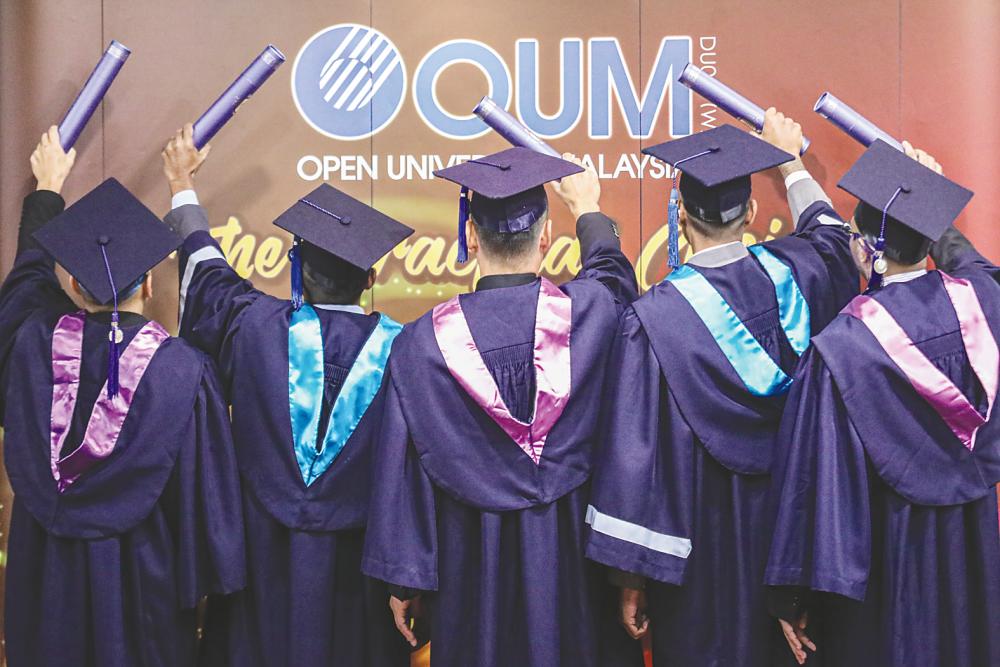KUALA LUMPUR: In March, Higher Education Minister Datuk Seri Dr Noraini Ahmad told Parliament 17,613 public university students dropped out in 2021, and 5,165 others suspended their education without providing reasons.
She also said 20,577 private university students postponed their studies for reasons such as personal or family health issues, financial problems, and to get a job.
Yet, since the Malaysian Prison Department (MPD) tie-up with Open University Malaysia (OUM) in 2009, 21 inmates have graduated with diplomas, bachelor’s, master’s and doctorate degrees.
theSun spoke to two of five Kajang Prison inmates who graduated at OUM’s 26th Convocation at the World Trade Centre Kuala Lumpur on Sunday.
Their real names and the crimes they committed have been left out to protect their identities.
Indran, 35, from Klang, who graduated with a Bachelor in Business Administration, said he was ecstatic and grateful for the opportunity to achieve something while serving time.
Having already spent nine years in prison, he will be released in 2028, and is now in his second semester as he pursues his Master in Business Administration (MBA).
“Everyone deserves a second chance. OUM and MPD have allowed me to study, and I am grateful for the endless support they and my family have given me,” he said.
When told about the thousands of students who have dropped out of universities, he said: “I am surprised. They should concentrate on their studies because education is crucial. It helps one to get a good job, and the knowledge we gain can help shape our lives.”
He said Kajang Prison provides a classroom and computers for them to complete assignments, and allows morning and evening tutorials for face-to-face lessons. During the examination week, inmates are allowed to take books to their cells to study.
Indran aims to continue with his doctorate in economics and criminology after completing his MBA. He aspires to become a social entrepreneur to help people who share the same fate as him and offer them a second chance, just as he received.
Wong, 46, graduated with a Diploma in Management and said he aims to open a restaurant or a tailoring shop as he likes to cook and learnt to sew traditional apparel, such as the baju kurung, baju Melayu and kebaya.
Sentenced to life in prison, he wishes to pursue a bachelor’s degree.
His diploma studies were sponsored by Buddha’s Light International Association (BLIA), which has committed to sponsoring him for his next course of study as well.
“I am grateful to BLIA, OUM and the prisons department for the opportunity to study. I hope I can be released early so I can make full use of the knowledge that I have gained,” he said, adding that retailing and relationship marketing are among his favourite subjects.
On the importance of education and staying the course, he said completing his diploma was a challenge as he started from zero and was not interested in education before entering prison.
“Students on the outside can relax when they are stressed, but those within the prison walls live a very rigid life and follow a strict regimen,” he said, advising students to study hard and not deviate from their education.
OUM president and vice-chancellor Assoc Prof Dr Ahmad Izanee Awang said the institution is committed to supporting inmates who wish to study, adding that it provides support via the usual online teaching.
However, since inmates have limitations to internet access, OUM supplements its teaching aids with printed materials and prison visits by faculty members.
“We try to cater to their needs and set them up for success. Many students’ progress was delayed because of Covid-19. But now, they have resumed their studies as usual,” he told theSun.
Ahmad Izanee said OUM is also going to work with the prisons department to establish an institution that is exclusively used to train and educate many more inmates.
OUM Faculty of Business and Management Associate Professor Dr Santhi Raghavan said there are two inmates from Kajang prison who are currently pursuing their doctoral degrees.
“This is undoubtedly an achievement we can be proud of. It goes to show that we are helping prison inmates to better themselves and become academically successful, too, so that when they complete their sentences, they can reintegrate into society and break the criminal cycle,” she said.









